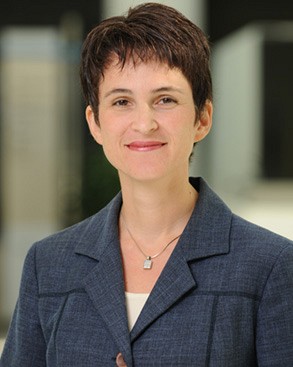As a young girl growing up in Turkey, Beril Toktay accepted water and air pollution as a fact of life. "It wasn't until I went abroad that I saw how much better it could be," says the professor of operations management and holder of the Brady Family Chair at Georgia Tech Scheller College of Business.
This realization fueled Toktay's interest in sustainability. Today, she is internationally known as a scholar in the field of sustainable operations management, with a focus on socially responsible, environmentally friendly business practices.
"She is one of the pioneers in this research area," says Scheller College of Business Dean Steve Salbu.
Creating Sustainability Center
Toktay recently led the College's efforts to win a $750,000 grant from the Ray C. Anderson Foundation to start the Center on Business Strategies for Sustainability, followed by a $300,000 grant from the Kendeda Fund. The center will focus on conducting high-impact research, educating tomorrow's business leaders, and partnering with industry to accelerate the development and adoption of sustainable business practices.
"Interest in sustainability has grown tremendously in both the business world and academia," says Toktay. "When I first started my career, not that many people were researching it. But Scheller College now has faculty in different areas, from operations and finance to business ethics and marketing, addressing various aspects of sustainability, including socially responsible investing, corporate social responsibility, and sustainable operations.
"We hope to leverage all of this expertise through the new center and pursue collaborative, value-adding partnerships within the broader sustainability community at Georgia Tech and beyond," she says.
Early Environmental Focus
Toktay's research into sustainable business began almost as soon as she started her doctoral studies at Massachusetts Institute of Technology. Her first project dealt with the Kodak single-use camera that was popular at the time. Under pressure from environmentalists, Kodak figured out they could save money and materials by reusing lenses and circuit boards from these cameras, so the company worked out incentives for photo processors to return the devices. "My project focused on the supply chain issues that came up as a result," she says.
Currently, Toktay is contributing to the development of proposed legislation that would extend manufacturer responsibility over the life of a product. For example, when a user is done with a computer, the manufacturer would be responsible for paying for its recycling.
"If you make the manufacturer responsible for costs at the end of a product's life cycle, you give them incentive to design a product so that it's environmentally friendly, thus closing the loop, but how the legislation is implemented makes a big difference to its impact."
Leader in the Field
Toktay, who joined Georgia Tech's faculty from INSEAD in 2005, has won several National Science Foundation grants and published widely in leading journals. President of the Manufacturing and Service Operations Management Society (M&SOM), Toktay is senior editor of Production and Operations Management, area editor (Environment, Energy, Sustainability) of Operations Research, co-editor of the M&SOM Special Issue on the Environment, and associate editor of Management Science and M&SOM.
Some of her research has focused on the environmentally friendly practice of refurbishing computer equipment and selling it on the secondary market. She explains that in some cases, original equipment manufacturers of IT-related products, such as servers, have made efforts to squelch the secondary market for their products through high relicensing fees, fearing the competition would cannibalize new sales.
But her research team's work has highlighted the importance of supporting secondary markets under a wide range of industry conditions. "We've shown that it's not necessary to kill the secondary market for a product," she notes. "Companies like IBM have gained significant value from secondary markets through combining leasing strategies with asset recovery operations."
Focused on Students, Faculty
To encourage these types of sustainability practices, Toktay has introduced innovation tournaments in her MBA-level course Business Strategies for Sustainability. Students generate business model or product ideas that would have a positive environmental or social impact, and class voting and input determines and refines the best ideas. Winners go on to develop an early-stage business plan and investor pitch.
"We're harnessing the collective wisdom and creativity of the class to come up with one or two good ideas that might tie into structures at Tech that help aspiring entrepreneurs," Toktay says.
In addition to her interest in sustainability, Toktay is active in issues affecting women in academia. In 2012, she was named the College's new ADVANCE Professor, a role that is focused on supporting the advancement of women in academia. "The goal is to ensure that Georgia Tech is doing its best at recruiting and retaining as diverse a population of scholars as possible," she says.

